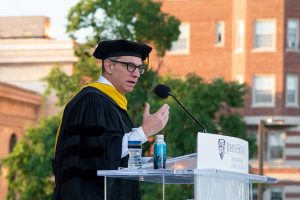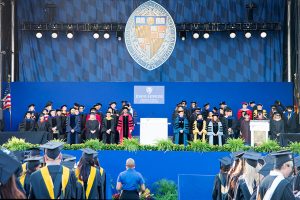Johns Hopkins University’s Krieger School of Arts and Sciences recognized and celebrated its 2024 master’s program graduates—including those from more than 25 programs offered by the Advanced Academic Programs division—at the 2024 Krieger School of Arts and Sciences Master’s Graduation Ceremony on Monday, May 20.
 More than 900 graduates crossed the stage on Homewood Field in Baltimore to mark the occasion, with more than 4,500 guests in attendance.
More than 900 graduates crossed the stage on Homewood Field in Baltimore to mark the occasion, with more than 4,500 guests in attendance.
Veronica Donahue, the associate dean for graduate and professional programs in the Krieger School of Arts and Sciences, kicked off the event and welcomed Ray Jayawardhana, Johns Hopkins University’s Provost, and Christopher S. Celenza, the James B. Knapp Dean of the Krieger School of Arts and Sciences.
Celenza addressed the graduates and congratulated them on their hard-earned achievement, noting that many juggled full-time work and family obligations to overcome the challenges of graduate school.
“That tells me a great deal about you,” Celenza told the graduates. “It says that you made a decision not to let any obstacle stop you. That one way or another, you found it within yourself—day after day and through all the late nights—to persevere and reach this milestone. Because it was that important to you, and because you knew you had something that important to offer the world.”
Jayawardhana then addressed the graduates, encouraging them to make a commitment to lifelong learning. “Allow this master’s degree to be a catalyst rather than a culmination,” he said. “Seek out new topics and disciplines to explore. Read, listen, and watch voraciously. Question incessantly. Remain a perpetual student open to growth and reinvention.”
Following Jayawardhana’s remarks, guest speaker Clint Watts took the stage, offering the graduates advice on how to achieve professional success and happiness. Watts is the leader of the Microsoft Threat Analysis Center, which detects and disrupts foreign malign-influence efforts affecting democracies globally.
“First and foremost, the path to long-term professional success and great happiness does not arise from endless watching of thirty-second social media clips that tell you ‘if you do these five things your life will go great,’” he told the graduates. “You will ultimately discover that life is an unknowable roller coaster and there are some general principles but no prescription for great professional achievement and happiness.”
 Instead, each person must find their own recipe for success, he said. Watts gained insight into those principles as he traveled along a career path that took surprising turns and included time as a U.S. Army infantry officer, FBI special agent, Intelligence Community analyst, book author, and media contributor. “I have learned some things along the way. The way the world changes in unexpected ways,” he said. “Whatever you want to do or think you will pursue, you will do some of those things, but it’s the unexpected and the unknowable that will drive the course of your life.”
Instead, each person must find their own recipe for success, he said. Watts gained insight into those principles as he traveled along a career path that took surprising turns and included time as a U.S. Army infantry officer, FBI special agent, Intelligence Community analyst, book author, and media contributor. “I have learned some things along the way. The way the world changes in unexpected ways,” he said. “Whatever you want to do or think you will pursue, you will do some of those things, but it’s the unexpected and the unknowable that will drive the course of your life.”
To succeed, Watts offered the graduates three keys to success—plus an essential ingredient.
Looking back to a required computer programming course he took as a student at West Point, Watts told the audience that he fared poorly on a key programming test and that his eventual rise to his role with Microsoft wouldn’t have been possible had he lacked the ability to adapt.
“Each step of the way I forced myself to learn a new skill and embrace the tool I needed to accomplish my mission,” he said. “If you want to thrive and succeed, learning is a constant.”
Watts went on to share his second key to success, exploration, pointing to his decision to become a substitute teacher prior to going to graduate school. “My former colleagues thought I was crazy, wasting my time when I should be seeking an internship in national security, gaining ground on an impressive career in Washington, D.C.,” he said. Instead, the experience taught him patience and empathy and gave him skills to connect with diverse audiences, which he later used as an instructor at West Point and the FBI Academy, when testifying before Congress, opining on news shows, or even teaching his daughter, who has autism.
“If you can get comfortable being uncomfortable, you’ll be able to do your best in any environment,” he said. “Always take that next adventure and explore the next opportunity.”
Watts then shared his third key to success, resiliency. “Resiliency in the face of adversity—persisting just a little bit longer when one gets stuck, over time usually leads to the greatest accomplishments,” he said. “Victory comes to those that finish things more than those that start them.”
As crucial as adaption, exploration, and resiliency are, Watts suggested graduates will also need a vital “secret ingredient,” to succeed. “Even if you adapt, explore, and remain resilient in your career, you will fall short of your greatest potential if you choose to go it alone. Teams always achieve more than individuals over time.”
Part of each graduate’s team moving into the future will be their Johns Hopkins mentors and peers. “There will be a boardroom or a conference room somewhere, a waiting room or an airport lounge, or somewhere in the most remote places of the earth where you will bump into one of your Johns Hopkins colleagues and you will come up with the solutions to the world’s greatest problems,” he said.
And while it can be tempting today to view the challenges of tomorrow in a negative light, Watts told the graduates he sees a bright future. “You’ve learned a lot here at Johns Hopkins and I can’t wait to see you take on the world’s toughest challenges and author the future,” he said. “You are going to do great, and the world will be a better place because of you.”
As the graduates prepared to cross the stage, Donahue noted that the moment would be the culmination of their hard work and perseverance. “It is the next step on the path forward, where they will share with the world the expertise and perspectives they gained in the Krieger School of Arts and Sciences Master’s programs,” she said.
Following the ceremony, the graduates, their guests, and Johns Hopkins faculty and staff celebrated with a reception on Keyser Quad.